General
Vice Chancellor’s Roster against Sexual Harassment Meets, Shares Milestones & Experiences
Published
4 years agoon
By
Mak Editor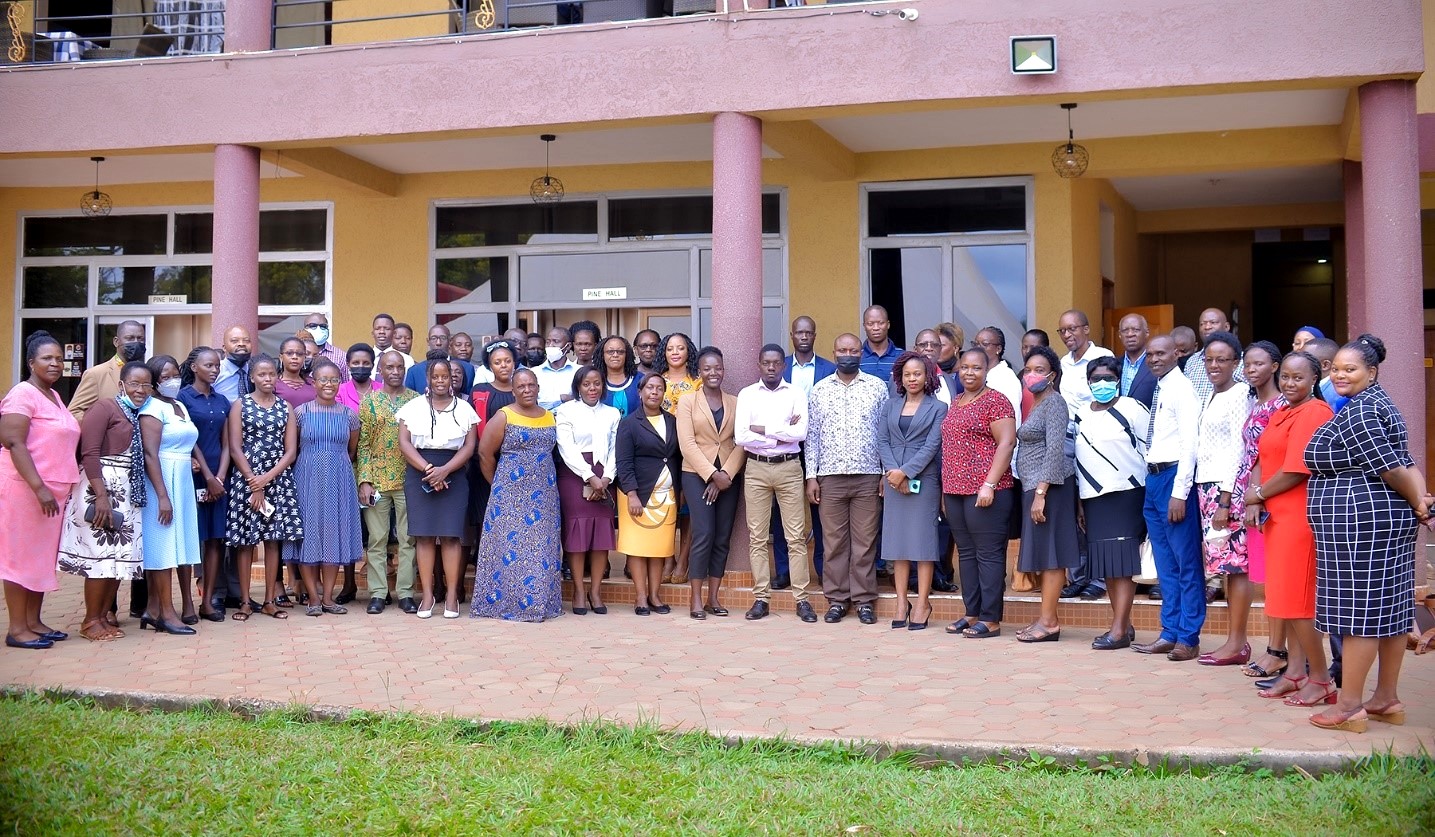
The Vice Chancellor’s Roster of 100 to investigate Sexual Harassment at Makerere University has called upon the University Leadership to reinforce its commitment and support toward elimination of violence, abuse and sexual harassment at the university. This was during the two days (14th– 15th June 2022) of the Refresher Training that was organized by Makerere University Gender Mainstreaming Directorate in partnership with UN Women.
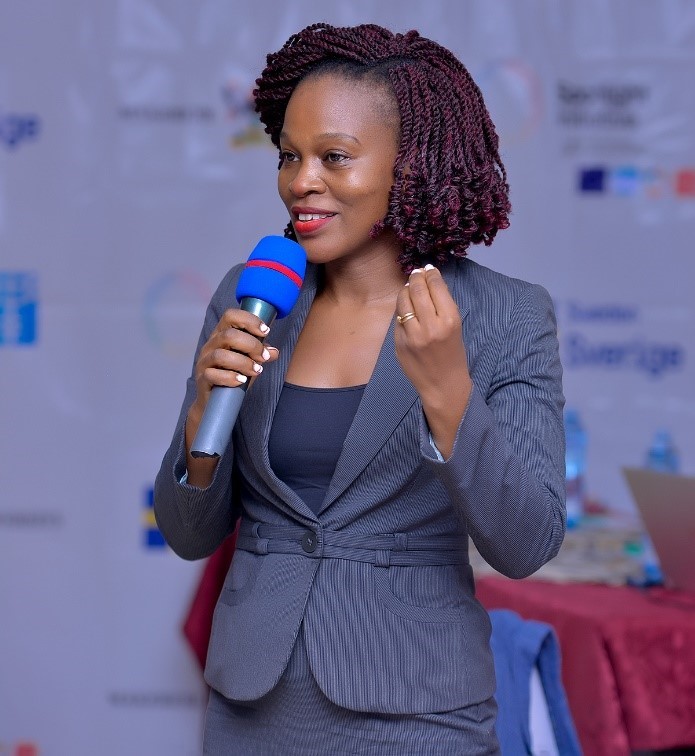
In line with section 18 part (a) of Makerere University Policy and Regulations against sexual harassment 2006 (as amended), the Vice-Chancellor on 1st August 2019, appointed 100 members of the Vice Chancellor’s Standing Roster to investigate sexual harassment.
According to Makerere University Policy and Regulations against Sexual Harassment, the Vice Chancellor’s Roster of 100 includes well-selected persons of integrity from which ad-hoc committees will be drawn to investigate specific reported complaints of sexual harassment. The Roster represents all categories of groups in the University community that is; academic, administrative, and support staff, students (undergraduate and postgraduate) as well as all hierarchical ranks within those categories.
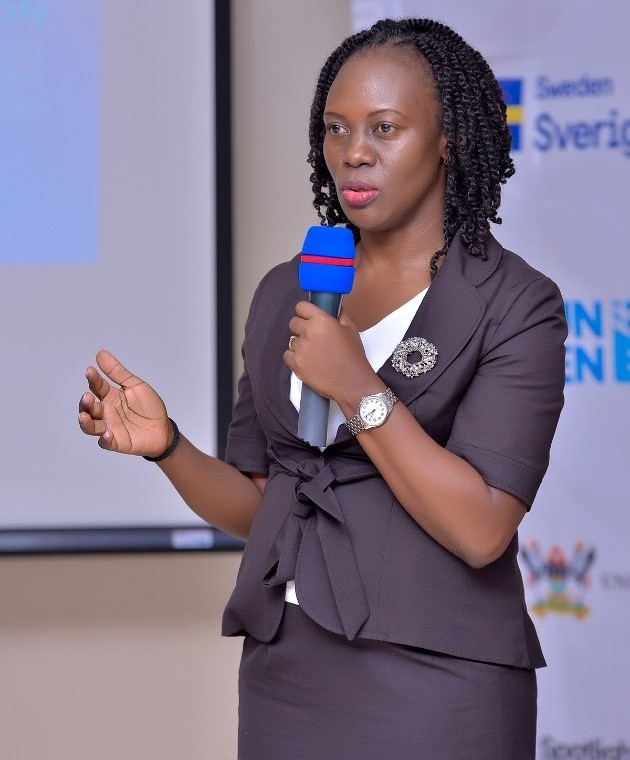
The team appreciated the University Management for taking a bold step aimed at breaking the power-authority chains that had acted as barricades to perpetrators and protected them as untouchables. They further appealed to the University leadership to always cooperate and support the teams/members investigating sexual harassment cases. “We need back up from the leadership to ensure that however powerful a person is, as long as they have been mentioned in any Sexual Harassment scandal, they are not protected.”
During the training, the team recognized the critical importance of their work and also highlighted the possible risks involved when investigating sexual harassment cases including death threats to both the victims and investigators. In addition, the team recorded the need to intensify sensitization campaigns in order to reduce the knowledge gap on Gender-Based Violence, abuse, and sexual Harassment that exists among staff and students as well as the wider University community.
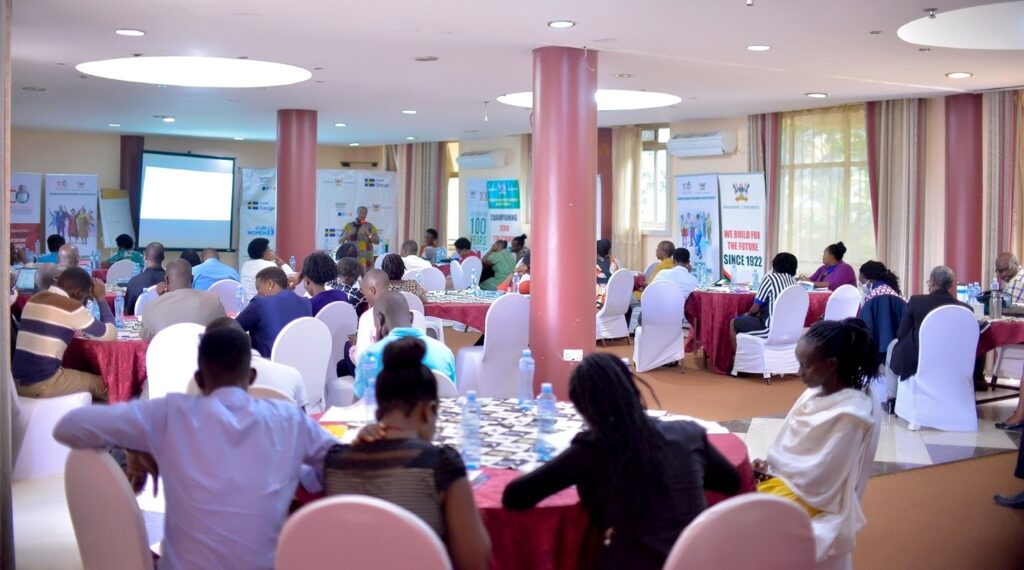
Sharing milestones and experiences
The team also shared experiences, and progress achieved throughout the two years of executing their work. In a presentation made by Ms. Susan Mbabazi, the Principal Gender Officer -Gender Mainstreaming Directorate, since 2019, the VC’s Roster of 100 has been able to investigate to conclusion eight (8) cases out of the twenty-two that were reported.
“Twenty-two cases have been reported for the last two years, eight (8) were investigated to conclusion of which five (5) were successfully handled and three (3) were acquitted, one (1) case has been referred to the police; Three (3) cases were overtaken by events and they lost jurisdiction and one (1) case was withdrawn,” she said.
Ms. Mbabazi noted that the results indicate a stronger step that has been taken by the team to execute their duties amidst recognizable challenges including the COVID-19 pandemic that hit the world for two years. She was optimistic that after the lockdown, their work will be much easier, highlighting the Nine (9) cases that are currently being investigated.
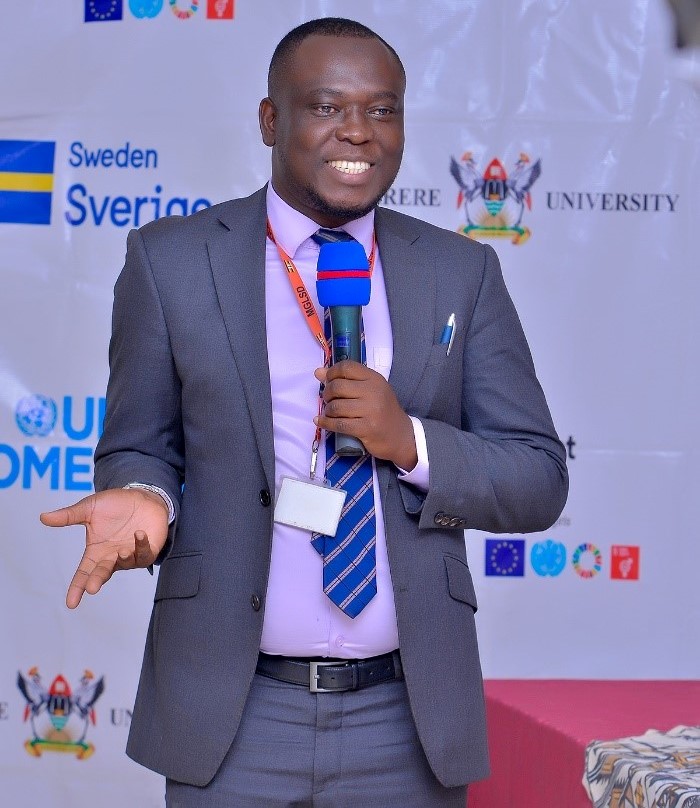
In the same training, participants also reflected on the Makerere University Gender Equity Policy and Policy and Regulations against Sexual Harassment as key tools in the fight against the vice at the university. In an interactive session conducted by the Director of Gender Mainstreaming, Dr. Euzobia Mugisha Baine, the team called for an enhancement in the dissemination and communication of the two policies to both staff and students.
“It is high time we utilize all the communication and information points of the university to communicate and emphasize the importance of the two policies. The extended knowledge of the policies should be one of the key performance indicators for the University and students’ leadership,” they noted.
In a speech read by Ms. Nina Asiimwe Byarugaba, the Deputy Country Representative of UN Women Uganda Ms. Adekemi Ndieli, commended Makerere University for the review and production of the Policy and Regulation Against Sexual Harassment; noting that the policy provides the much-needed institutional framework to effectively respond to sexual harassment issues in a well-coordinated, coherent fashion, one that will particularly promote perpetrator accountability.
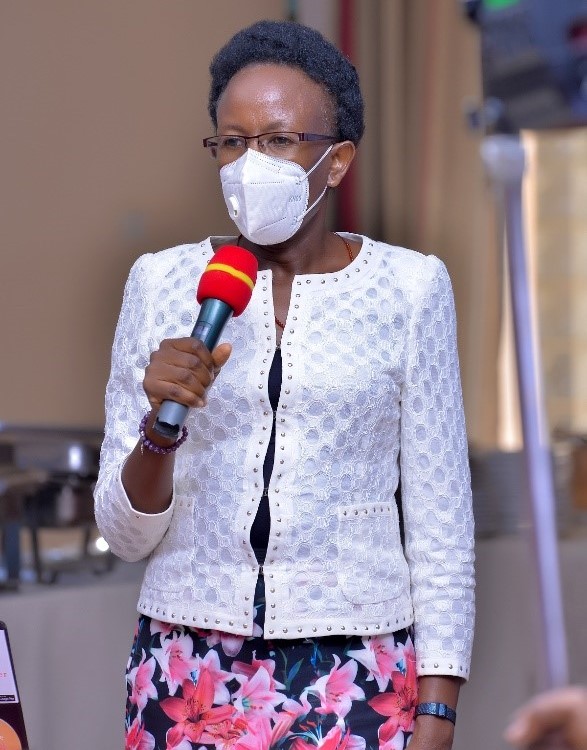
“UN Women in Uganda is committed to ending all forms of violence against women and girls. We recognize that ending violence against women and girls is a critical move to ensure that they have access to justice. We emphasize that access to justice is an essential ingredient for effective, accountable, and gender-responsive to the realization of women’s and girls’ rights which cannot be denied,” she said.
Noting that violence against women and girls is highly pervasive, entrenched and normalized in Uganda, Ms. Ndieli, stressed, that although efforts have been put in place to abate it, through legislation and sensitization of the relevant duty bearers on how to effectively manage gender-based violence cases, obtaining full protection and accountability of GBV crimes remains a challenge.
“We are mindful of the fact that efficient and effective management of gender-based violence cases requires extensive preparation, specific skills, substantive knowledge and resources, and the Policy and Regulation Against Sexual Harassment is a critical solution to these needs,” she noted.
She extended sincere appreciation to the Gender Mainstreaming Directorate and Makerere University for conducting a refresher training for members of the Vice Chancellor’s Roster of 100 as a follow-up on progress as well as re-equipping the team with skills and techniques for addressing some of the persistent challenges of access to justice for women and girls.
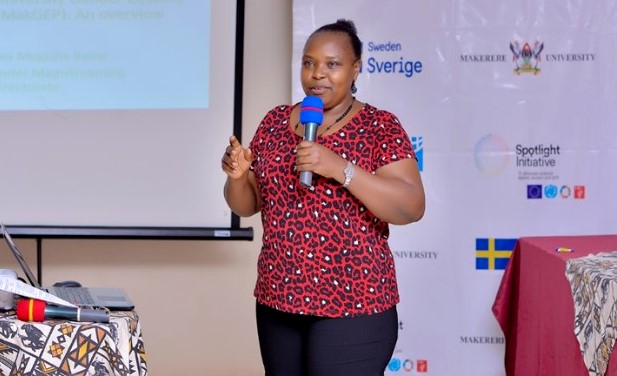
Members also highlighted the role of men in the elimination of gender-based violence and particularly, sexual harassment among communities. In a presentation made on Male Engagement in Gender equality interventions: What can men do to work with women in challenging sexual harassment and gender-based violence at Makerere University, Dr. Julius Kikooma noted the manner in which the socialization processes are embedded within the men’s sexuality and their psyche is ill-explored. According to him, the socialization processes that men undergo in their sexual development can lead them toward normalizing sexual violence.
He called for collective efforts to harness positive masculinities to promote an educational environment that is free of sexual harassment. In the same spirit, Dr. Kikooma urged the Makerere University community to open up opportunities to question hegemonic beliefs and practices upon which harmful forms of masculinities in Higher education institutions are constituted.
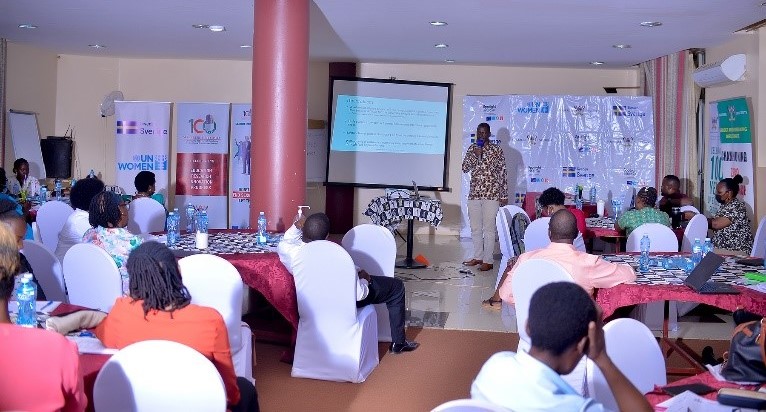
“We need to rethink and re-imagine institutions of higher learning as intellectual spaces with Institutionalized structures and spaces that promote conversation on progressive male behaviors and practices,” he stated.
Participants were also engaged on:
- Legal and Policy Frameworks for Gender-Based Violence and Violence against Women and Girls by Mr. Mayanja Idi Mubarak, Principal Women in Development Officer- Ministry of Gender, Labour and Social Development
- Sexual Harassment Prosecutions; Lessons from the Office of the Director of Public Prosecutions by Samali Wakooli, Assistant Director of Public Prosecutions and Head of Gender Children and Sexual Offences Department.
- Sexual Harassment Investigations; Lessons from the Uganda Police Force by Rose Nalubega, Commissioner, Sexual, Children Offences and Trafficking in Persons Department, Directorate of CID, Uganda Police Force.
- Strategies for effective staff and student mobilization against sexual harassment by Prof. Fred Babweteera
You may like
-


Over 9,200 to graduate at Makerere University’s 76th Graduation
-


Meet Najjuka Whitney, The Girl Who Missed Law and Found Her Voice
-


Makerere University School of Public Health Graduates First Cohort of Cost-Effectiveness Analysis Short Course
-


Climate variability found to shape malaria trends in Yumbe District
-


Mak hosts First African Symposium on Natural Capital Accounting and Climate-Sensitive Macroeconomic Modelling
-


Uganda Martyrs Namugongo Students Turn Organic Waste into Soap in an Innovative School Project on Sustainable Waste Management
General
Over 9,200 to graduate at Makerere University’s 76th Graduation
Published
4 hours agoon
February 24, 2026
Pomp and colour defined the opening day of the Makerere University’s 76th Graduation Ceremony as thousands gathered to celebrate academic excellence and new beginnings.
The historic ceremony has brought together scholars, families, friends and industry partners in a vibrant celebration of achievement and possibility. Throughout the four-day event, the University will confer degrees and award diplomas to 9,295 graduands in recognition of their dedication and hard work.
Among the graduates, 213 will receive Doctor of Philosophy (PhD) degrees, 2,503 will graduate with Master’s degrees, and 6,343 will earn Bachelor’s degrees. In addition, 206 students will graduate with postgraduate diplomas, while 30 will be awarded undergraduate diplomas.
Of the total number of graduands, 4,262 are female and 5,033 are male. According to Vice Chancellor, this marks the first time in 15 years that male graduands have outnumbered their female counterparts.
The best overall graduand in the Sciences, Esther Ziribaggwa, graduated on the opening day with the Bachelor of Agricultural and Rural Innovation and an impressive Cumulative Grade Point Average (CGPA) of 4.77.

The ceremony marks a proud moment for Makerere University as it continues to nurture top-tier professionals across diverse fields.
While presiding over the graduation, the State Minister for Primary Education, Hon. Dr. Joyce Moriku Kaducu, on behalf of the First Lady and Minister of Education and Sports, Hon. Janet Kataaha Museveni, pointed out that Makerere University is a model institution, where leaders are nurtured, scholars are sharpened, and where dreams have been given direction.
In her address, Hon. Museveni, highlighted Government’s deliberate investment in research, innovation, and infrastructure to strengthen higher education in Uganda.
“The establishment of the Makerere University Research and Innovation Fund (RIF), supports high-impact research and innovation that directly contributes to national priorities and development. Through this initiative, thousands of researchers and innovators have pursued practical, scalable solutions that are transforming communities and key sectors across Uganda,” Mrs Museveni, said.
The Minister also noted that Parliament’s approved a USD 162 million concessional loan to upgrade science, technology, and innovation infrastructure at Makerere University. The funding will facilitate the construction of modern laboratories, smart classrooms, and state-of-the-art facilities for Engineering and Health Sciences, investments expected to position the University firmly within the Fourth Industrial Revolution.
“Government has embarked on the construction of a National Stadium at Makerere University and other institutions of higher learning across the country. This will promote physical education, strengthen talent identification, and boost investment in the sports sector,”

Turning to the graduands, the Minister encouraged them to see themselves not merely as job seekers, but as job creators and solution-makers.
Uganda and Africa need innovators who will modernize agriculture; engineers who will build quality infrastructure; healthcare professionals who will strengthen health systems; and educators who will inspire the next generation,” the Honourable Minister said.
She reminded graduates that they are entering a rapidly changing world shaped by Artificial Intelligence, climate change, and shifting global markets. To thrive, she advised them to remain adaptable, creative, and committed to lifelong learning.
She also encouraged graduates interested in entrepreneurship to tap into the Government’s Parish Development Model, which provides community-based financing and production support.
Quoting Proverbs 3:5–6, the Minister urged the graduates to trust in God as they embark on their next chapter.
She extended special appreciation to the Mastercard Foundation for its 13-year partnership with Makerere University in expanding access to education and empowering young people in Uganda and beyond.
In his speech, the Chancellor of Makerere University, Dr Crispus Kiyonga, urged graduands to harness research, innovation and technology to drive Uganda’s transformation.

“This is a milestone in your lives. You have invested time, discipline and hard work to attain these qualifications. It is important that you derive value from this achievement, not only for yourselves, but for your families and for society.” Dr Kiyonga, said.
Dr. Kiyonga expressed gratitude to the Government of Uganda for its continued financial support to the University, particularly the funding allocated under MakRIF, which he described as critical in strengthening the institution’s research capacity.
“Research plays a very vital role in the development of any community. Makerere as the oldest University in the country is doing a significant amount of research, However, more work is required to mobilize additional resources to further strengthen research at the University.” Dr Kiyonga, noted.
Acknowledging the challenges of a competitive job market, Dr. Kiyonga encouraged graduates to think beyond traditional employment pathways.
“It is true that the job market may not absorb all of you immediately. But the knowledge you have acquired is empowering. You can create work for yourselves, individually or in teams.” Dr Kiyonga, said.
He advised the graduands to embrace discipline, integrity and adaptability in the workplace, and to take advantage of technology and digital platforms to innovate and respond to societal challenges.
“Every development challenge presents an opportunity. Believe that you can apply your knowledge to create solutions with impact.” He said.
Addressing the congregation, the Vice Chancellor, Prof Barnabas Nawangwe, congratulated the graduands, particularly staff and societal leaders on their respective achievements.

“I congratulate all our graduands upon reaching this milestone. In a special way I congratulate the members of staff, Ministers, and Members of Parliament that are graduating today as well as children and spouses of members of staff,” Prof Nawangwe, said.
In his speech, Prof Nawangwe, recognized outstanding PhD students, particularly members of staff. who completed their PhDs in record time without even taking leave from their duties.
He called upon graduates not to despise humble beginnings but rather reflect on the immense opportunities around them and rise to the occasion as entrepreneurs.
“You are all graduating with disciplines that are needed by society. We have equipped you with the knowledge and skills that will make you employable or create your own businesses and employ others. Do not despair if you cannot find employment. Instead, reflect on the immense opportunities around you and rise to the occasion as an entrepreneur,” Prof Nawangwe, said.
Prof Nawangwe called upon the graduands of PhDs to use their degrees to transform the African continent.
“As you leave the gates of Makerere I urge you to put to good use the knowledge you have received from one of the best universities in the World to improve yourselves, your families, your communities, your Country and humanity. Let people see you and know that you are a Makerere alumnus because of the way you carry yourself in society with dignity and integrity. Put your trust in God and honour your parents and opportunities will be opened for you,” Prof Nawangwe, said.
Delivering a key note address, Prof. Nicholas Ozor, the Executive Director of the African Technology Policy Studies Network Nairobi, Kenya ((ATPS). Reminded the graduates that a degree is not a finish line but the beginning of accountability. “The world is a complex, fast changing and deeply unequal. Degrees make you responsible for others not better than them,” Prof Ozor, said.

The 76th Graduation Ceremony of Makerere University will be held from Tuesday 24th to Friday 27th February, 2026. A total of 213 PhDs (87 female, 126 male), 2,503 Masters (1,087 female, 1,416 male), 206 Postgraduate Diplomas (80 female, 126 male), 6,343 Undergraduate Degrees (2,999 female, 3,344 male), and 30 Undergraduate Diplomas (9 female, 21 male) will be graduating from all the Colleges.
Ms. Sarah Aloyo and Ms. Nakato Dorothy both students of the Bachelor of Procurement and Supply Chain Management emerged as the best in the Humanities and Best Overall students with a CGPA of 4.93. Mr. Ssewalu Abdul, a Bachelor of Leisure and Hospitality Management student emerged second best in the Humanities with a CGPA 4.90. Ms. Esther Ziribaggwa emerged as the best student in the Sciences with a CGPA of 4.77 in the Bachelor of Agricultural and Rural Innovation, while Mr. Simon Mungudit emerged second best in the Sciences with a CGPA of 4.76 in the Bachelor of Science in Petroleum Geoscience and Production.
Commencement Speakers
- Day 1 – Prof. Nicholas Ozor, the Executive Director of the African Technology Policy Studies Network, Nairobi, Kenya
- Day 2 – Prof. Dr. Maggie Kigozi, Chairperson Makerere University Endowment Fund Board
- Day 3 – Dr. Patricia Adongo Ojangole, Managing Director, Uganda Development Bank Limited
- Day 4 – Ms. Reeta Roy, Former President & Chief Executive Officer, Mastercard Foundation
The 76th Graduation Ceremony will be held at the Freedom Square following the schedule below:
Tuesday, 24th February, 2026
College of Agricultural and Environmental Sciences (CAES)
College of Computing and Information Sciences (CoCIS)
College of Education and External Studies (CEES)
School of Law (SoL)
Livestream Link for Day 1: https://youtube.com/live/wVGPA0FJ9pU
Wednesday, 25th February, 2026
College of Health Sciences (CHS)
College of Natural Sciences (CoNAS)
College of Veterinary Medicine, Animal Resources and Bio-security (CoVAB)
School of Public Health (SPH)
Thursday, 26th February, 2026
Makerere University Business School (MUBS)
College of Business and Management Sciences (CoBAMS)
Friday, 27th February, 2026
College of Engineering, Design, Art and Technology (CEDAT)
College of Humanities and Social Sciences (CHUSS)
Institute of Gender and Development Studies (IGDS)
Makerere Institute of Social Research (MISR)
General
Mak Selected to Host Alliance for African Partnership Africa Office
Published
1 day agoon
February 23, 2026
Makerere University has been selected to host the Africa Office of the Alliance for African Partnership (AAP). The significant milestone that underscores Makerere’s role in fostering research, innovation, and global collaborations across the continent was announced at a meeting of the University’s Central Management with an AAP delegation on 23rd February 2026.
Makerere’s selection was based on the University’s robust commitment, alignment with the AAP’s Strategic Plan, and proven ability to manage consortium activities. The AAP, which was initiated by Michigan State University (MSU) in collaboration with Ten African Universities and agricultural policy research networks in 2016, targets critical challenges in education, youth empowerment, health and nutrition, agri-food systems, science and technology, water, energy, environment, and culture and society.
Addressing the delegation consisting of AAP Co-Directors from MSU, Dr. Jose Jackson-Malete and Dr. Amy Jamison, accompanied by newly-appointed Director of the AAP Africa Office, Dr. Racheal Ddungu Mugabi and Ms. Clare Cheromoi, the Vice Chancellor, Prof. Barnabas Nawangwe who appreciated the choice of Makerere to host the Africa Office said:
“One of the greatest challenges facing African universities is PhD training, particularly supervisory capacity. Through partnerships such as the Alliance for African Partnership we can leverage international expertise to strengthen supervision—whether through training supervisors or through joint supervision arrangements.”
Prof. Nawangwe equally applauded joint initiatives such as the Grant Writing and Publication project, which gave rise to the establishment of a Writing Centre that he said can be used to build capacity in AAP member universities with Makerere as the hub. Officially launched on 21st March 2023, the project is living up to its expectation of becoming a springboard for strong postdoctoral collaborative research for both institutions and other US universities.
Dr. Titus Awokuse, Vice Provost and Dean for International Studies and Programs at Michigan State University (MSU) who attended virtually, reiterated that Makerere’s selection reflects its long-standing commitment to advancing African higher education, research excellence, and meaningful global collaboration.
Reflecting on the origins of the Alliance for African Partnerships (AAP), Dr. Awokuse explained that nearly a decade ago, MSU initiated a transformative conversation in Atlanta centered on the question: How should we partner differently? From this dialogue emerged AAP—an Africa-centered consortium that now brings together 12 institutions across Africa and the United States.

He emphasized that AAP is grounded in equity, mutual benefit, shared leadership, and deep respect for African priorities and expertise. Since its founding, MSU has served as convener and key supporter, working with member institutions to strengthen research collaboration, promote faculty and student engagement, and address shared development priorities.
Dr. Awokuse underscored that AAP’s success is the result of collective vision and commitment, not the efforts of a single institution. He paid tribute to Lilongwe University of Agriculture and Natural Resources for hosting the Africa Office in its early years and acknowledged the foundational leadership of the inaugural Africa Office Director.
He described the launch of the Africa Office at Makerere University as a significant milestone that reinforces Africa-led leadership, strengthens regional collaboration, and enhances responsiveness to emerging opportunities. MSU, he affirmed, remains fully committed to AAP and to working closely with Makerere and all consortium partners to expand collaborative research, nurture the next generation of scholars, and advance Africa-led solutions to global challenges.
The newly-appointed AAP Africa Office Director, Dr. Racheal Ddungu Mugabi is a member of faculty in the Department of Development Studies, Institute of Gender and Development Studies. Her work on intersectional inequalities in Uganda and other Global South regions uniquely positions her to drive collaborative research and partnerships at the Africa Office.
Initially founded by ten African Universities and MSU, AAP now comprises eleven African members including; the African Network of Agricultural Policy Institutes (ANAPRI)-Zambia, Egerton University-Kenya, Lilongwe University of Agriculture and Natural Resources (LUANAR)-Malawi, Makerere University-Uganda, United States International University-Africa-Kenya, Universite Cheikh Anta Diop-Senegal, Universite Yambo Ouologuem de Bamako-Mali, University of Botswana-Botswana, University of Dar es Salaam-Tanzania, University of Nigeria, Nsukka-Nigeria, and the latest, University of Pretoria-South Africa.
These Universites collaborate under Focal Points to advance policy-relevant research and sustainable development. Makerere University’s Focal Point is Prof. Robert Wamala, Director of Research, Innovations and Partnerships (DRIP).
Addressing the University Management, Dr. Jackson-Malete outlined the African Futures Research Leadership Program, which nurtures early career scholars through mentorship and skill-building as one of AAP’s flagship programs. She noted that the Program that prioritizes female participants or men committed to promoting women in higher education has for the first time during its fifth cohort admitted the first male, Dr. Alfadaniels Mabingo from the Department of Performing Arts and Film, Makerere University.
The AAP Africa Office at Makerere will coordinate activities, boost research collaboration, mobilize resources, and enhance global engagements for socio-economic transformation. This aligns with Makerere‘s broader goals of leveraging international expertise to build resilient institutions.
View more photos from the event: https://flic.kr/s/aHBqjCLjoA
Trending
-

 Humanities & Social Sciences2 days ago
Humanities & Social Sciences2 days agoMeet Najjuka Whitney, The Girl Who Missed Law and Found Her Voice
-

 Health6 days ago
Health6 days agoUganda has until 2030 to end Open Defecation as Ntaro’s PhD Examines Kabale’s Progress
-

 Agriculture & Environment5 days ago
Agriculture & Environment5 days agoUganda Martyrs Namugongo Students Turn Organic Waste into Soap in an Innovative School Project on Sustainable Waste Management
-

 General6 days ago
General6 days agoMastercard Foundation Scholars embrace and honour their rich cultural diversity
-

 Health2 weeks ago
Health2 weeks agoCall for Applications: Short Course in Molecular Diagnostics March 2026
